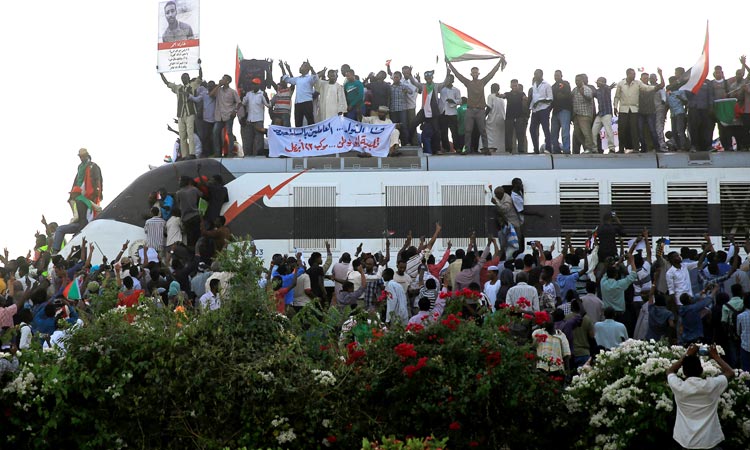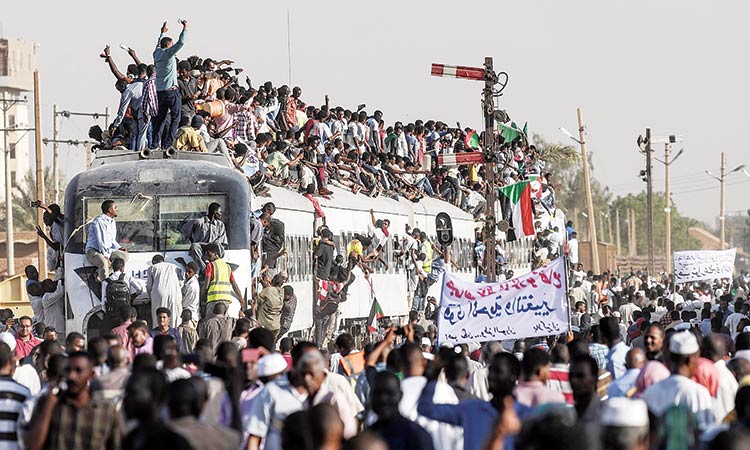Women take leading role in Sudan protests against Bashir

Sudanese protesters rally in front of the military headquarters in the capital Khartoum on Monday. Agence France-Presse
Sara Abdelgalil, head of the UK branch of the Sudan Doctors’ Union, told AFP that Bashir had tried to suppress women during the 30 years he has been in power.
“This regime could not crush down women and women’s ability to fight for change and freedom,” said Abdelgalil, a doctor who moved to Britain in 2001 but is in contact with protest leaders.
“Sudanese women’s resistance and resilience overcome this suppression,” said the 44-year-old.
Protests in Sudan against the government’s decision to triple the price of bread began on December 19 in the central town of Atbara, quickly spreading to the capital Khartoum and other towns.
Officials say 32 people have died in protest-related violence so far, while Human Rights Watch has put the death toll at 51.
The Sudanese Professionals Association (SPA), which the doctors’ union is linked to, is leading the protests.
Nemat Malik, an 80-year-old nurse and a university professor in Khartoum, said she was pleased to see so many women − particularly students − taking part.
“This regime is a lot of harassment and oppression for women especially. Women have suffered a lot.
“They look at how you dress and they can give you lashes. That’s why we should be very much interested in overthrowing this regime,” she said.
Sudan adopted sharia law in 1983, but since then has only implemented it randomly.
Under Bashir, who came to power with the help of Islamists in 1989, some rules have been tightened.
According to Sudanese non-governmental groups, some 15,000 women were sentenced to flogging in 2016.
Ihsan Fagiri, 65, a doctor who also teaches in Khartoum, said she was detained for two and a half months by Sudanese security forces to keep her away from the protests.
Sudanese protesters on Monday called on the army to hold talks on forming a transitional government, as thousands braved a deadly crackdown for a third day to urge the military to back them.
The east African country has been rocked by more than three months of protests that erupted over a hike in bread prices before transforming into nationwide demonstrations against President Omar al-Bashir’s iron-fisted 30-year rule.
At the biggest rally so far, thousands of protesters have since Saturday been camped out around the army headquarters in Khartoum which also houses Bashir’s residence and the defence ministry.
They are calling on the military to protect them and to back calls for Bashir to resign.
“When the army is here, we have no fear,” protesters flashing victory signs chanted as military vehicles with soldiers fanned out around the complex, onlookers said.
Riot police have fired tear gas at the protesters, but they have failed to dislodge them.
Officials say 38 people have died in protest-related violence since December.
Interior Minister Bushara Juma said seven protesters died on Saturday when forces tried to disperse them and 15 were wounded along with 42 members of the security forces. In all, 2,496 protesters were arrested. The group spearheading the protests on Monday appealed to the army for talks on forming a transitional government.
“We call on the Sudanese armed forces to talk directly with the Alliance for Freedom and Change for facilitating the peaceful process of forming a transitional government,” said Omar el-Digeir, a senior member of the group.
Digeir said the protest organisers had also formed a council to initiate talks with security forces and the international community aimed at agreeing a transition that gives power to a “transitional government that represents the wish of the revolution”.
“We reiterate our people’s demand that the head of the regime and his government have to immediately step down,” Digeir said.
Reading from a statement, he also called on the armed forces “to withdraw their support for a regime that has lost its legitimacy” and to support the “people’s alternative for a transition to a civilian democratic government”.
Agence France-Presse







